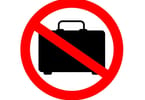CHICAGO/ATLANTA – US airlines, which have already downsized, may be forced to defer or cancel more aircraft orders as the prolonged recession erodes travel demand further and continues to choke credit markets.
Experts say the possibility for more order modifications in the near future is growing. That’s bad news for airlines in dire need of modern aircraft and also for plane makers.
“Once (airlines) start looking at what they need for the future and trying to preserve as much cash as they can, I think it’s quite possible we’ll see some major order deferrals if not outright cancellations,” said Jim Corridore, airline analyst with Standard & Poor’s Equity Research.
For US airlines that currently lag foreign rivals in fleet renewal, the need is great for fuel-efficient planes to bolster their competitive positions and to meet potential demand for heightened energy conservation.
Meanwhile, plane makers Boeing Co. and Airbus, who get paid when they deliver aircraft, face a weaker growth outlook. Airlines are already discussing changes to their plane orders, said J.P. Morgan analyst Joseph Nadol.
“A number of airlines are in negotiations with Boeing and Airbus for order modifications, and agreements may be reached in the coming weeks,” Nadol said in a March 25 research note.
“Falling demand should ultimately prompt Boeing and Airbus to cut rates, and while the timing is uncertain, we see announcements coming sooner rather than later,” he added.
Airbus spokesman Stefan Schaffrath said the company was in “constant talks” with its customers but that the discussions were confidential.
DELIVERIES SET, BUT GROWTH QUESTIONABLE
With the exception of UAL Corp’s United Airlines, the six largest U.S. airlines have deliveries planned for 2009.
AMR Corp’s American Airlines, which is replenishing its fleet, plans to take delivery of 29 Boeing 737s.
Delta Air Lines has 32 aircraft on order for 2009 delivery. Delta has 18 firm orders for the delayed 787 Dreamliner, but the delivery timetable is uncertain. Delta declined to comment on possible changes to its fleet plan. Continental Airlines, which will take delivery of 13 737s this year, said it has not changed its order plans. Southwest Airlines expects to take delivery of 13 737s this year, although the airline has curbed its growth plans amid weak travel demand.
“Everybody is looking far more closely at aircraft that were envisioned as growth airplanes,” said airline consultant Robert Mann.
He said orders that are part of a growth strategy are more likely to be stopped than orders that are part of fleet replenishment. Airlines need modern, fuel-efficient planes to remain competitive.
“If you can afford to do it, this is a great time to be renewing a fleet,” Mann said. “They need to be taking the airplanes, assuming they have a long view of the business.”
FUTURE MURKY FOR PLANE MAKERS
Aside from capacity cuts, aircraft orders are also being hit by tight credit markets, which make it hard for airlines to finance expensive aircraft.
Many carriers take advantage of manufacturer financing, but some experts have questioned whether such financing will be available. Boeing Commercial Airplanes Chief Executive Scott Carson said in March that customer financing for new orders is sufficient into 2010. The impact of order deferral and cancellations by U.S. carriers on plane makers is debatable. Both Airbus and Boeing have enormous order backlogs, and the bulk of those orders are from Asian and Middle Eastern buyers.
Boeing, which has received more cancellations than orders this year, has nearly 3,600 orders yet to be delivered — about seven years worth of production. The company said, however, that the diversity of buyers on its order books will insulate it from the pain of airline capacity cuts.
“The fact that it’s diversified by region and business model, I think that will help us through this downturn,” said Boeing spokesman Bernard Choi.
Consultant Mann disagreed, saying the global nature of the economic downturn could leave the company with completed aircraft that have no buyers.
“You see the very great possibility that Airbus and Boeing and Embraer and Bombardier will end up with airplanes on the ramp with no place to go,” Mann said. “I think that time is not far off.”
WHAT TO TAKE AWAY FROM THIS ARTICLE:
- For US airlines that currently lag foreign rivals in fleet renewal, the need is great for fuel-efficient planes to bolster their competitive positions and to meet potential demand for heightened energy conservation.
- “A number of airlines are in negotiations with Boeing and Airbus for order modifications, and agreements may be reached in the coming weeks,”.
- He said orders that are part of a growth strategy are more likely to be stopped than orders that are part of fleet replenishment.






















